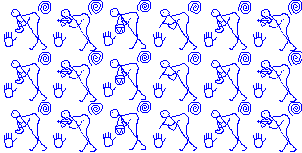byJane Candia Coleman
This week I have driven hundreds of miles from the great Southeastern valleys of Arizona to the Gila Mountains of New Mexico, and in every one of those miles was another seeing.
If it is possible to exhaust the visual memory, I have done so. Inside I am heavy and weightless both at once. I draw memories out one by one and together, for they run together, a melting pot of emotion.
It is always the light that astounds, the light of a thousand miles of sky reflected, absorbed by the palette of pale earth. Beside this Southwestern light, Arles fades, and Venice, the Côte d'Azur, and the single-rayed luminosities of Rembrandt. Both daunting and poignant, it sears through the eyes and into the heart where it becomes a part of the body's pulse, a memory felt when no longer seen.
And the light of late Fall is most miraculous of all, burning, lifting, singing, a tangible, musical thing that quivers and strikes where and when it will.
I have seen so much light, so much violent color, so many fires, that my mind is exhausted with the recording of it. I am touched with ocher, rose, shimmering gold; with the silver of the moon, the flanks of stone mountains washed with a shade of apricot so unreal no painter would dare attempt reproduction.
Whoever first named New Mexico, "The Land of Enchantment," was blessed with vision and with a sense of fantasy. Cross the border between the states, and you are, indeed, enchanted, more so the farther you go.
Route I-10 leads through Stein's Pass, a jumble of golden mountains, and down onto the Animas Playa. In summer this stretch of white sand is blinding. It reflects the heat, the light with the intensity of a furnace, a parched, drifting desert of alkali. In Fall it fills with water from the rains, becomes an unbounded sheet of blue broken by stems of grass, by the lifting-off of water birds. It is more mirage than actuality, especially for one who has known it in July. If I were to walk toward it, would it recede, lure me into the vast anatomy of the plain? Would the birds rise, startled and clucking at my approach? Would the whistling swan unfold, a true mirage, or geese lift, honking their winter music? I do not go. Perhaps there is in me a place that prefers fantasy to reality, that does not wish to put imagination to the test for fear of damaging what is enchanted.
At Lordsburg we turn off for Silver City. the road rises up a long hill, gradually but steadily. behind us the Playa shimmers, the mountain ranges fade out in successive lines of blue and lavender, one of the few abstractions in nature, a challenge to the eyes and fingers of the artist. Who among us could mix or even visualize the myriad tones, depths, shades of blue? Water, hills, mountains, canyons repeating one after the other until the sky, itself a pale and shimmering blue unlike any other.
"It's all too much," I say, as I say often. looking down I see my hands balled into fists, symbols of the futility of possessing any part of what I see. "I wish I were immortal."
"Why?" my friend asks.
And I say, "So I could stand here forever and see, and nothing would ever change. then I'd have a chance at it."
But how to choose the time and place for one's immortality? As we move ahead, the sun drops behind us, breathes fire at earth and sky. The road is lined with chamiso blooming. The golden flower heads, the grayish foliage, deepen in color and toss in the wind, searing me with intensity - theirs and my own response. And the land ahead begins to burn, the flanks and shoulders of the mountains turning rose, then crimson, an impossible radiance that lingers even when the sun has gone. In the Swiss Alps this phenomenon is labeled, "Alpenglow," a word that, like most, fails to capture the actuality or the response. What was earth, rock, crevice is now only a softness, coals dwindling beneath the ashes of the slow dark - a promise of warmth, the gentle tongue of land unchanged, unchanging.
In Silver City the air is clean, the smell of piñon fires a drug. I walk, nose in the air like a dog, tasting it all, and finally sink down in sleep with the colors and shapes of earth whirling behind my eyes like the pattern of a quilt.
In the morning there is frost. The junipers sparkle, and the long russet grasses of autumn. Along the creeks and bottoms, cottonwoods and poplars dance their ceaseless yellow dance against the sky - silk flags, golden shoes, small faces lifting and falling with or without wind, as if, in the fastening of leaf to twig there is electricity, a spark that lights and stimulates.
You cannot look at them for long, but must turn away, fasten on the mundane things of earth - wire fences, stacked logs, the adobe walls of houses - because, looking, a desire so strong comes upon you that you cannot exist with it in comfort. It is the desire to mingle with the leaves, to dance the incessant dance, uncaring of wind or winter. It is the need, basic to us all, to be one with something of beauty, to be in and of the self magnificent, if only for a moment. It is a wish for the freedom of death, the melting down of the bones into earth, the flight of the spirit upward, unbound. And if I were to stand here, on this road a long time, with the golden flicker tracking eyes and face, I would, I think, surely die of it.
Books by Jane Candia Coleman
